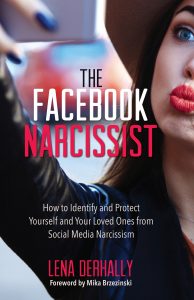Beyond offering more avenues for infidelity, there are other ways that social media can cause fissures in a romantic relationship. For example, jealousy, addiction, over-sharing something personal about a significant other, and comparison to others are things that can easily cause conflict.
True narcissists want to make their partners jealous, relishing in envisioning them anxious and distressed. Narcissistic online behavior as it relates to romantic relationships can range from being slightly problematic to, at its worst, emotionally abusive. On the milder side, someone who is more self-centered rather than cruel may not be thinking about how they make their partner feel when they post something that might make their partner uncomfortable. They simply seek immediate self-gratification but do not intend to upset their partner.
If someone posts online content about their partner that is deeply personal, airs dirty laundry about the relationship—or really anything that crosses a boundary—it signals they are not considering their partner’s feelings. If someone expresses displeasure with any online postings, and the poster nevertheless continues, then there is intentional malice and disrespect happening. Blatant, willful, and intentional disregard for the boundaries and comfort of the other person is textbook narcissism.
An insecure person, not necessarily narcissistic, may use social media to make their partner jealous. They might equate jealousy to caring. A narcissist, however, is malevolent and uses jealousy as a way to torment the other person.
How can you know the difference between the two? A person who is not a narcissist will ultimately feel remorse if they do something that hurts their partner, while a narcissist will not and will continue to repeat the problematic behaviors. Narcissists are always pushing boundaries.
Facebook jealousy and surveillance (checking a romantic partner’s Facebook page) were found to be positively associated with anxiety in one study.75 For example, someone may observe their partner becoming Facebook friends with an attractive man or woman, or in another situation, the partner is still friends with an ex on the site. The observance of these events may inspire even more surveillance and checking, which leads to more jealousy and anxiety. Therefore, the more one observes these occurrences, the more jealous and anxious they feel. Facebook surveillance that is defined as cyberstalking will be explored later on in this book. While it is hard to say whether the person who became anxious due to surveillance of their partner’s social media page was predisposed to anxiety or the anxiety was only created because of the surveillance on social media, jealousy stemming from social media certainly exacerbates anxiety no matter how you look at it.
Even very secure people sometimes get jealous and feel threatened in their relationships, and social media doesn’t help. For example, if someone sees their partner following and liking the posts of Instagram models, especially if the photos are sexually explicit, it would be a normal reaction to feel annoyed or jealous. We all want to feel special in our relationships, and we want to believe we are the most attractive to our partners, even if we do not mind if they find other people attractive (which is completely normal and expected). The biggest underlying issue in any relationship conflict is whether your partner respects you and your boundaries and expresses concern if you are upset about something. A good partner should also have the willingness to change or modify behavior that is hurtful or harmful to you.
Selfies are also associated with lower-quality relationships, according to a study where the researchers suggest that “selfie-related conflicts” cause jealousy in relationships because of excessive individual photo-sharing and commenting on those photos from other people. Furthermore, by sharing favorable images, the person creates an ideal online persona in their mind that “diverges from real life and these conflicts in turn reduce perceived quality of the romantic relationships.” The results from the study concluded that “jealousy and the online ideal persona have a negative effect on romantic relationship over time.”76
If lots of selfies are related to narcissism, even if the act of taking selfies seems relatively harmless on the narcissism spectrum, it still has the potential to cause problems in relationships. If we don’t want certain social media behaviors to erode our relationships, it’s worth it to self-reflect on whether our social media behaviors are having a negative impact on them. If they are, where do we need to pause, self-reflect, and modify for the sake of our relationships?
Do we do things on social media that make our partners uncomfortable or put them in an awkward position? Do we post things on social media that make our partners feel shame or embarrassment? Do we post things on social media that we know might make them jealous? Do we spend too much time on social media, and does that take away from our quality time with our partners? Does comparing ourselves to others make us resent our own relationships? While some of these things may seem relatively harmless, they have the potential to cause issues down the road. On the bright side, with awareness and an investment in the well-being of our relationships, all these things can be self-corrected before too much damage is done.
Endnotes:
75Tara C. Marshall, Kathrine Bejanyan, Gaia Di Castro, and Ruth A. Lee. “Attachment Styles as Predictors of Facebook‐Related Jealousy and Surveillance in Romantic Relationships.” Wiley Online Library. John Wiley & Sons, Ltd, January 16, 2012. https://onlinelibrary. wiley.com/doi/abs/10.1111/j.1475-6811.2011.01393.x.
76Daniel Halpern, James E. Katz, and Camila Carril. “The Online Ideal Persona vs. the Jealousy Effect: Two Explanations of Why Selfies Are Associated with Lower-Quality Romantic Relationships.” Telematics and Informatics. Pergamon, May 3, 2016. https://www.sciencedirect.com/science/article/abs/pii/S0736585316300545
This excerpt is from Lena Derhally’s new book, The Facebook Narcissist: How to Identify and Protect Yourself and Your Loved Ones from Social Media Narcissism. Reprinted with permission from Health Communications, Inc.

The Facebook Narcissist is available from Amazon and Bookshop.
